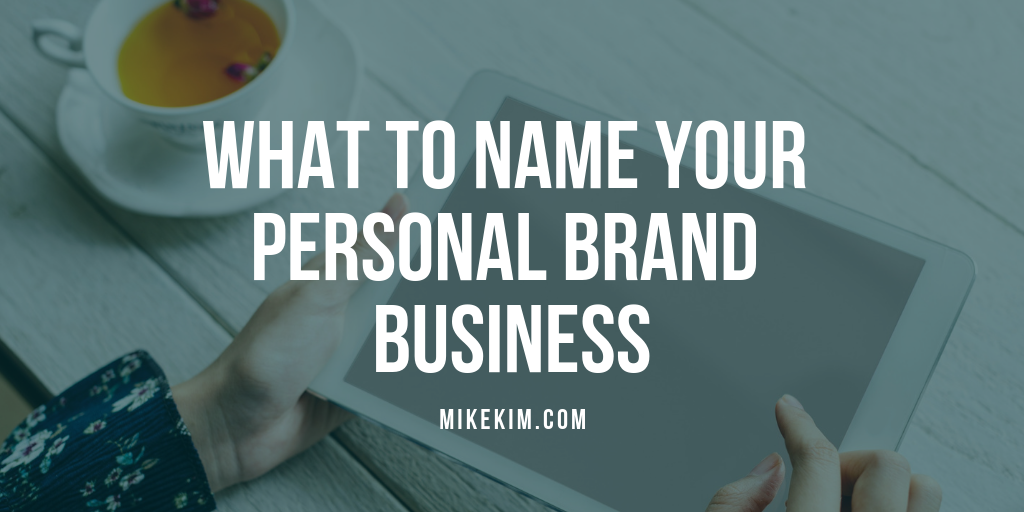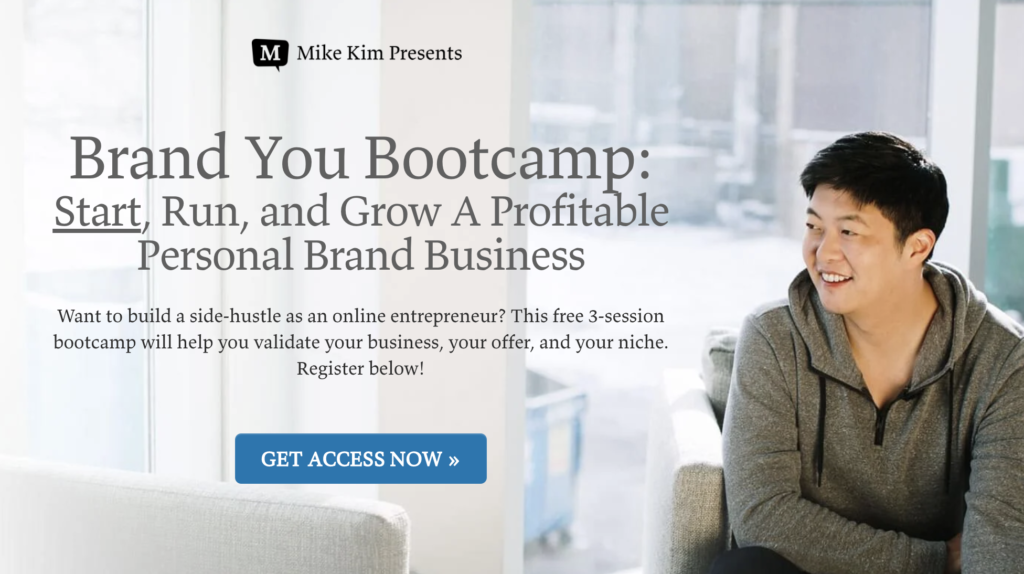 If I had a dollar for every time somebody asked me about naming their personal brand (or their website), I’d have quite a few dollars.
If I had a dollar for every time somebody asked me about naming their personal brand (or their website), I’d have quite a few dollars.
I’ll cut straight to the chase. My personal recommendation is:
Name your business after yourself.
Here’s why: no one calls you by some corporate sounding name. I’ve been in business for myself as a consultant for years, and no one (who has paid me) has ever denied me because my website wasn’t “Summit Think Tank Marketing Consultations” or some other bloated, corporate name.
They simply call me by name, Mike Kim.
For the past few years, I’ve specialized in the thought leadership space. I use that term to refer to people who are paid for their thoughts: consultants, coaches, speakers, and authors. I’ve been hired by some of today’s top thought leaders, including John Maxwell, Donald Miller, Paul Martinelli, Suzanne Evans, Catalyst Leadership, and more. All of these clients were referrals.
No one referred me as, “Mr. Corporate-Sounding Brand Trying To Sound Larger Than He Really Is.” They referred me as Mike Kim. They told their friends and colleagues, “Hey, this guy Mike, he really helped me. You’ve got to try him out.”
I am the brand, and you are your brand.
I get a lot of pushback on this, but think about this: Tiger, Gaga, Oprah, Trump, Madonna, Ellen, Michelangelo. These names are instantly recognizable with just a few syllables. Some are so “branded” they don’t even need a last name anymore. No one calls Ellen, “Ellen Degeneres” — they just call her Ellen.
You may not become world-famous like these folks, but the principle is this: a name carries an overpowering set of qualities, emotions, and associations in a way that no corporate sounding brand can.
If you’re still uncomfortable with naming the business (or even your website) after yourself, let me bust some myths that may help you get a bit more clarity.
Myth #1: The Public Cares About Your Business
This may sound harsh, but the reality is that most of the public doesn’t know that you and I even exist. When you’re a personal brand, especially when starting out, visibility is more important than ability.
You might be awesome at what you do, but if no one knows about you — it’s a serious marketing problem. The good news is that if you’re on social media, you’re visible. If you’re part of a board within your community, you’re visible. If you hang out with friends, you’re visible.
If you’re just starting out, don’t try to find new audiences. Rather, leverage the people who already know you, leverage the exposure you already have, and slowly (but intentionally) craft the narrative of who you are and what you want to be known for.
Myth #2: You Are Offering Something Different Or Superior To Your Competitors. You’re Not.
The reality is that your offers are very similar to your competitors. If you’re a designer, you’re probably offering similar design packages. If you’re a coach, you’re probably offering one-on-one sessions, group sessions, online courses, and perhaps a few workshops. There’s nothing different about this than any of your competitors!
You are in a fight for attention, not quality. A qualitative advantage will not set you apart when no one knows who you are in the first place.
Here’s your only real advantage: the brand called YOU. You are the reason people want to do business with YOU, and understanding this allows you to market yourself like no one else can.
If you take greater control of the narrative and emotional associations that people have about you, you’ll earn their trust and be able to serve as a guide.
Scott Bedbury, former advertising director and CMO of Nike and Starbucks respectively, described branding like this:
“A great brand taps into emotions. Emotions drive most, if not all, of our decisions. A brand reaches out with a powerful connecting experience. It’s an emotional connecting point that transcends the product. A great brand is a story that’s never completely told.”
I love that. If you’re a personal brand, it’s not the name of your company that’s going to drive business. It’s going to be you and the emotions that stir when people think about you — just like Ellen, Trump, or Gaga. Love ’em or hate ’em, they certainly stir up emotions.
You may object and say, “Mike, you don’t understand. I plan to be big. I’m going to be epic and worldwide!” Ok, great. Then think about these brands: Ferragamo, Versace, Prada, Kohler, Bentley, Cartier, L’Oreal. They are all named after their founders. Even Walmart and Sam’s Club are named after the Walton family.
If You’re Still Not Convinced, Here’s Two Ways You Can Go (Good Luck)
If you are still not convinced and you insist on having some corporate name, there’s still one or two ways that you can go:
#1. Name your business with terminology that identifies what the business is.
An example would be Prudential Life Insurance, because the name clearly states what that business does. You can tack your name onto an identifier in the brand as well, like Williams Construction Company. The idea is that the business name tells you what the business is.
(Let’s be real though, what would you remember more: mikekim.com, or mikekimenterprisemarketingservices.com?)
#2. Name your business with terminology you shape to mean something else.
I hope you have millions of dollars and about 10 years of disposable time, because that’s what it’s going to take to do this.
Examples of this: Amazon and Apple. Apple took a fruit and turned it into a computer company, of all things. Amazon took the name of a jungle! Think about how much time and money it took to reshape what people think about these two very common words. Are you willing to do the same?
All of this is a lot of work, which is why I recommend you name your brand (and website) after yourself. Don’t get hung up here. Name it after yourself, and get started on more important things.
Looking at some of the biggest personal brands right now, do you even know their business names? Probably not! You don’t tell your friends to check out Robbins International, you tell them to check out Tony Robbins.
Financial guru Dave Ramsey’s company name (for years) was actually Lampo, but everyone referred to them as the Dave Ramsey Group. You’ll never see Lampo on his marketing materials, it’s all Dave Ramsey.
You are the brand, so name your business (or at least your website and marketing materials) after yourself.
Free Video Series: “Brand You Bootcamp”
Want to build a side-hustle as an online entrepreneur? This free 3-session bootcamp will help you validate your business, your offer, and your niche. Register below!
- How to ensure you build a business that’s both profitable AND aligned with your passions
- The key differences between a “how-to-preneur” and an “ideapreneur” (you MUST know this)
- How to market yourself ONLINE as a coach, consultant, speaker, blogger, or podcaster
- How to position yourself as an authority, even if you’re just starting out
- How to properly identify your ideal buyer with sniper-like accuracy (no, it’s not about demographics)
Register here: mikekim.com/bootcamp


